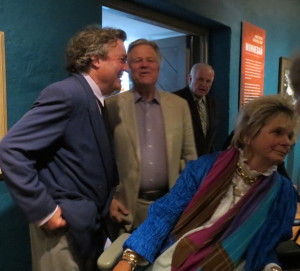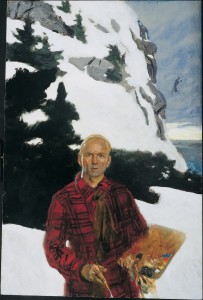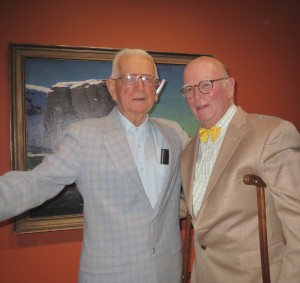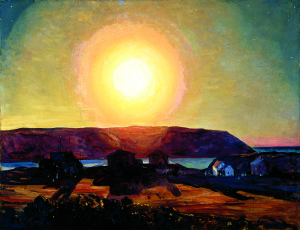Brandywine River Museum showcasing works by Jamie Wyeth, Rockwell Kent
By Kathleen Brady Shea, Managing Editor, The Times

Artist Jamie Wyeth (left) and his wife, Phyllis Wyeth, enjoy conversation with visitors at the Friday opening of his new exhibit at the Brandywine River Museum.
Jamie Wyeth’s 2013 “Portrait of Rockwell Kent” features the late artist in a pensive outdoor pose, clutching a brush and easel. In the background: a woman’s body hurtling off a cliff.
The macabre detail partly explains the primary reason the artists never met: The woman, Sally M. Moran, a 49-year-old socialite who had modeled for Kent, disappeared on July 9, 1953, from Kent’s cottage on Monhegan Island off the coast of Maine. Her body was found three weeks later 30 miles out sea, generating a scandal that implicated another painter and prompted Kent to leave the island for good.
Such fascinating details are interspersed in the curator’s notes for “Jamie Wyeth, Rockwell Kent and Monhegan,” an exhibit at the Brandywine River Museum that opened Friday. It is anchored by the connections the artists shared even though they never crossed paths on the beloved Maine outpost they both called home – rugged terrain that provides the setting for the exhibit’s third-floor showcase of sketches and paintings.

“Portrait of Rockwell Kent” by Jamie Wyeth is one of the paintings on display at the Brandywine River Museum for “Jamie Wyeth, Rockwell Kent, and Monhegan,” an exhibit that runs through Nov. 17.
The exhibit was organized by the Farnsworth Art Museum in Rockland, Maine, which displayed the bulk of the works last year. The Brandywine River Museum, which boldly placed the art on walls painted teal and orange, has added more than a dozen works, including the debut of Wyeth’s 2013 “Shipwreck.” Museum director Thomas Padon credited the dramatic palette to a Vancouver firm that assisted with the design.
Kent (1882-1971) was introduced to Monhegan in 1903 by his mentor, Robert Henri, prompting this response in a letter: “This place is more wonderful and beautiful than you told me it was.” He painted on the island from 1905-1910 and then returned in 1947 before exiting again in 1953.
Kent’s paintings prompted critic John Sloan to rave about his “broad, realistic, powerful representations of weltering seas, men laboring in boots, rude rocky headlands and snowbound landscapes … with paint “laid on by an athlete of the brush.”
For Jamie Wyeth (b. 1946), Monhegan was a place frequented by his grandfather, N.C. Wyeth, and his father, Andrew Wyeth, in the 1930s. He first visited with his father in the mid-1950s. In 1968, Jamie Wyeth used the proceeds from his successful, one-man show in New York at age 21 to buy a home Kent built on Monhegan.
At one point, Wyeth wrote that he resented the island’s popularity among artists. “I began to wish that Monhegan would have been a retreat for dentists,” leaving the “island’s visual riches all to myself.”

Karl Kuerner, whose farm was a frequent Andrew Wyeth and whose son of the same name is an artist, poses with George A. “Frolic” Weymouth, an artist and co-founder and board chairman of the Brandywine Conservancy, at the opening of “Jamie Wyeth, Rockwell Kent and Monhegan.”
Wyeth began collecting works by Kent, and many of the paintings in the exhibit are owned by Wyeth and his wife, Phyllis. And while Kent typically used the ocean in his scenes, Wyeth often turned his “back to the sea,” a perspective that enabled him to combine the vistas with some of his favorite, iconic elements such as animals, even Halloween.
Calling the show “a departure for the museum” – especially the vibrant walls and a giant photo at the entrance – Wyeth said he was very pleased with the results. “I think they’ve done a remarkable job,” he said.
Wyeth said he had corresponded with Kent, who had agreed to return to Monhegan to meet Wyeth. “Unfortunately, his death prevented that from happening,” Wyeth said ruefully.

“Late Afternoon, Monhegan Island” is a 1906-07 painting by Rockwell Kent that is included in the exhibit.
In a 2009 essay by Wyeth, entitled “The Ghost of Rockwell Kent and Me,” the heir to an artistic dynasty details his fascination with Kent’s legacy. The fact that their face-to-face encounter did not occur may only heighten the poignancy of the exhibit and to make the juxtaposition of images by both even more powerful.
The show will run through Nov. 17 at the museum on U.S. 1 in Chadds Ford, which is open daily from 9:30 a.m. to 4:30 p.m. For more information, visit http://www.brandywinemuseum.org.




